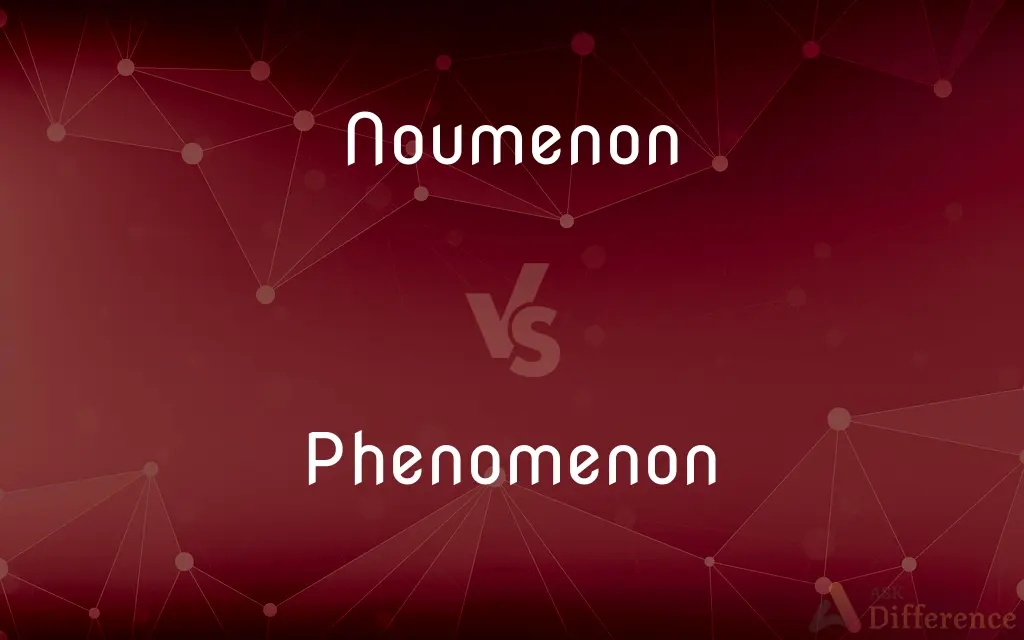Noumenon vs. Phenomenon — What's the Difference?
By Urooj Arif & Fiza Rafique — Updated on April 7, 2024
Noumenon refers to a concept in philosophy denoting the thing-in-itself, inaccessible to the senses, while phenomenon represents what is perceived or observable, shaped by sensory experience.

Difference Between Noumenon and Phenomenon
Table of Contents
ADVERTISEMENT
Key Differences
Noumenon is a philosophical term introduced by Immanuel Kant to describe objects as they exist independently of perception, implying an inherent reality that is beyond sensory data. Whereas, phenomenon refers to any observable event or entity as it appears to the human mind, shaped and interpreted through the faculties of sense and reason.
Noumena are considered the underlying reality that causes phenomena, but they remain fundamentally unknowable because our understanding is limited to the realm of appearances. On the other hand, phenomena are the basis of human experience and knowledge, comprising everything that can be seen, heard, or otherwise sensed.
While noumena represent the objective reality that is thought to exist behind the veil of sensory perception, phenomena are subjective, varying from one individual to another based on the interpretation of sensory data. This distinction emphasizes the difference between what is (noumenon) and how things appear to us (phenomenon).
Noumenon is often seen as a speculative concept, as it posits the existence of a reality that is completely detached from human experience and perception. In contrast, phenomenon is a more empirical concept, grounded in the observable world and verifiable through scientific inquiry.
The interplay between noumenon and phenomenon is central to many philosophical debates, particularly in epistemology and metaphysics, where understanding the nature of reality and our perception of it is paramount. While noumena might be seen as the foundation of phenomena, they elude direct understanding, reinforcing the complexity of discerning the true nature of reality.
ADVERTISEMENT
Comparison Chart
Definition
The thing-in-itself, independent of observation
An observable event or object as perceived by the senses
Accessibility
Inaccessible and unknowable through sensory experience
Accessible and knowable through sensory experience
Relation to Perception
Exists independently of human perception
Exists as it is perceived by human senses
Philosophical Context
Central in Kantian philosophy as a concept beyond senses
Central to empirical and scientific inquiry
Nature
Abstract and speculative
Concrete and empirical
Compare with Definitions
Noumenon
Kantian concept denoting the reality behind phenomena.
Philosophers debate whether noumenon can ever be truly known.
Phenomenon
Exists as perceived by human consciousness.
The sweetness of sugar is a phenomenon experienced through taste.
Noumenon
A thing as it is in itself, independent of observation.
The concept of noumenon challenges our understanding of reality by suggesting there's more than what meets the eye.
Phenomenon
Subject to interpretation and perception.
Optical illusions are phenomena that trick our visual perception.
Noumenon
Basis of phenomena, yet unknowable.
For Kant, the noumenon holds the essence of the phenomenal world.
Phenomenon
Grounded in empirical observation.
The phenomenon of gravity is observable through the falling of objects.
Noumenon
Theoretical or speculative reality.
Noumenon remains a controversial and intriguing aspect of metaphysical studies.
Phenomenon
An observable event or fact subject to sensory experience.
Northern lights are a natural phenomenon that fascinates scientists and tourists alike.
Noumenon
Inaccessible to human senses and cognition.
The noumenon of a tree exists beyond its perceived greenness and solidity.
Phenomenon
Central to scientific inquiry and understanding.
Studying atmospheric phenomena helps meteorologists predict weather patterns.
Noumenon
In philosophy, a noumenon (, UK also ; from Greek: νoούμενον; plural noumena) is a posited object or event that exists independently of human sense and/or perception. The term noumenon is generally used in contrast with, or in relation to, the term phenomenon, which refers to any object of the senses.
Phenomenon
A phenomenon (Greek: φαινόμενον, romanized: phainómenon, lit. 'thing appearing to view'; plural phenomena) is an observable fact or event. The term came into its modern philosophical usage through Immanuel Kant, who contrasted it with the noumenon, which cannot be directly observed.
Noumenon
In the philosophy of Kant, an object as it is in itself independent of the mind, as opposed to a phenomenon. Also called thing-in-itself.
Phenomenon
An occurrence, circumstance, or fact that is perceptible by the senses.
Noumenon
|_|philosophy|_|on}} A thing as it is independent of any conceptualization or perception by the human mind, postulated by practical reason but existing in a condition which is in principle unknowable and unexperienceable.
Phenomenon
An unusual, significant, or unaccountable fact or occurrence; a marvel.
Noumenon
The of itself unknown and unknowable rational object, or thing in itself, which is distinguished from the phenomenon through which it is apprehended by the senses, and by which it is interpreted and understood; - so used in the philosophy of Kant and his followers.
Phenomenon
A remarkable or outstanding person; a paragon.
Noumenon
The intellectual conception of a thing as it is in itself, not as it is known through perception
Phenomenon
(Philosophy) In the philosophy of Kant, an object as it is perceived by the senses, as opposed to a noumenon.
Phenomenon
(Physics) An observable event.
Phenomenon
A thing or being, event or process, perceptible through senses; or a fact or occurrence thereof.
Phenomenon
(by extension) A knowable thing or event eg by inference, especially in science
An electromagnetic phenomenon.
Phenomenon
A kind or type of phenomenon sense 1 or 2
A volcanic eruption is an impressive phenomenon.
Phenomenon
Appearance; a perceptible aspect of something that is mutable.
Phenomenon
A fact or event considered very unusual, curious, or astonishing by those who witness it.
Phenomenon
A wonderful or very remarkable person or thing.
Phenomenon
An experienced object whose constitution reflects the order and conceptual structure imposed upon it by the human mind (especially by the powers of perception and understanding).
Phenomenon
An appearance; anything visible; whatever, in matter or spirit, is apparent to, or is apprehended by, observation; as, the phenomena of heat, light, or electricity; phenomena of imagination or memory.
In the phenomena of the material world, and in many of the phenomena of mind.
Phenomenon
That which strikes one as strange, unusual, or unaccountable; an extraordinary or very remarkable person, thing, or occurrence; as, a musical phenomenon.
Phenomenon
Any state or process known through the senses rather than by intuition or reasoning
Phenomenon
A remarkable development
Common Curiosities
What is noumenon?
Noumenon is a philosophical term for the reality that exists independently of perception, considered unknowable and inaccessible to the senses.
Why is the concept of phenomenon important?
The concept of phenomenon is crucial for empirical science and philosophy, as it deals with the observable world and forms the basis of human knowledge.
How do noumena influence our understanding of the world?
Noumena challenge our understanding by suggesting that there is a deeper reality beyond what we can perceive, impacting philosophical and metaphysical inquiries.
Is the distinction between noumenon and phenomenon universally accepted?
The distinction is debated within philosophy, with some questioning the accessibility of noumenon and others disputing its existence.
How does phenomenon differ from noumenon?
Phenomenon refers to anything observable or perceivable through the senses, in contrast to noumenon, which exists beyond sensory experience.
Can noumenon be known or understood?
According to Kantian philosophy, noumenon cannot be directly known or understood because it exists independently of human perception.
Do noumenon and phenomenon exist independently of each other?
While noumenon and phenomenon are conceptually distinct, noumena are thought to be the underlying reality that gives rise to phenomena.
What role does perception play in understanding phenomenon?
Perception is central to understanding phenomena, as it involves the interpretation of sensory data to form knowledge about the world.
Can technology help us understand noumenon?
Technology extends our ability to observe and measure phenomena, but noumenon, by definition, remains beyond the reach of empirical investigation.
How can phenomenon be studied?
Phenomena can be studied through empirical observation, scientific experimentation, and sensory experience.
Can the concept of noumenon be applied in scientific inquiry?
Noumenon is more of a philosophical concept and less applicable in empirical science, which relies on observable and measurable phenomena.
Are phenomena always physical?
Not always; phenomena can also include psychological events and abstract concepts that are perceptible through human consciousness.
What does Kant say about noumenon and phenomenon?
Kant posits that noumena are the true reality that remains unknowable, while phenomena are the appearances accessible to human senses and cognition.
Can individuals experience noumenon directly?
No, individuals cannot experience noumenon directly, as it exists beyond the scope of human sensory experience and cognitive understanding.
How do noumenon and phenomenon relate to the study of metaphysics?
They are central to metaphysical studies that explore the nature of reality, existence, and the distinction between appearance and reality.
Share Your Discovery

Previous Comparison
Propitiation vs. Propitious
Next Comparison
Allow vs. DenyAuthor Spotlight
Written by
Urooj ArifUrooj is a skilled content writer at Ask Difference, known for her exceptional ability to simplify complex topics into engaging and informative content. With a passion for research and a flair for clear, concise writing, she consistently delivers articles that resonate with our diverse audience.
Co-written by
Fiza RafiqueFiza Rafique is a skilled content writer at AskDifference.com, where she meticulously refines and enhances written pieces. Drawing from her vast editorial expertise, Fiza ensures clarity, accuracy, and precision in every article. Passionate about language, she continually seeks to elevate the quality of content for readers worldwide.














































